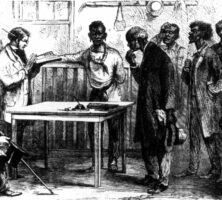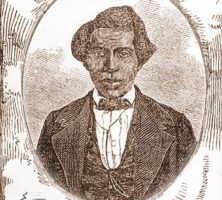Black men participated in Georgia politics for the first time during Congressional Reconstruction (1867-76). Between 1867 and 1872 sixty-nine African Americans served as delegates to the constitutional convention (1867-68) or as members of the state legislature. Jefferson Franklin Long, a tailor from Bibb County, sat in the U.S. Congress from December 1870 to March 1871. The three most prominent Black state legislators were Henry McNeal Turner, Tunis Campbell, and Aaron A. Bradley.
Turner came to Georgia from Washington, D.C., in 1865 to win Black congregations to the African Methodist Episcopal Church (AME). He was the most successful Black politician in organizing the Black Republican vote and attracted other ministers into politics. He was a delegate to the Georgia constitutional convention of 1867 and was elected to two terms in the Georgia legislature, beginning in 1868.

Campbell, a native of New Jersey, was a minister in the African Methodist Episcopal Zion Church. In 1864 he was appointed an agent of the Freedmen’s Bureau on the Georgia Sea Islands. He later moved to the mainland. In 1867 he was elected to the state constitutional convention. The next year he became a state senator from the Second Congressional District. He built an impressive political machine in and around Darien in McIntosh County.
Born in South Carolina, Bradley was a shoemaker in Augusta. Sometime around 1834 he ran away to the North, where he became a lawyer. In 1865 he returned to Georgia. He was the most outspoken member of the Black delegation to the constitutional convention. In 1868 he was elected state senator from the First District. Despite a checkered past, he rallied plantation workers around Savannah with his insistence that the formerly enslaved people be given land.
The church, with the enthusiastic support of Black women, who were still disenfranchised, was the center of African American political activity. Twenty-four legislators were ministers. However, religion, with its emphasis on the other world, may have predisposed some Black politicians to conciliation. Most Black delegates to the constitutional convention voted against including in the constitution the right of Blacks to hold office. Turner later bitterly regretted that vote.

In September 1868 the legislature expelled its African American members through an alliance between Democrats and Republicans opposed to a more radical Reconstruction. Energized, the Black legislators, led by Turner, successfully lobbied the federal government to reseat them. They continued to concentrate on political and civil rights. For many of them, education had been their highest priority since 1865. With their solid support, Georgia adopted public education.
Conservatives, generally white Southern Democrats used terror, intimidation, and the Ku Klux Klan to “redeem” the state. One quarter of the state’s Black legislators were killed, threatened, beaten, or jailed. In the December 1870 elections, Democrats won an overwhelming victory. However, the few counties with a Black majority of voters, concentrated in Georgia’s Lower Coastal Plain, continued to elect Black state legislators throughout the 1870s and 1880s. While largely excluded from the legislature, several Black leaders remained active in the state Republican Party, dominating the state party convention and its offices in 1880 They frequently came into conflict with “Lily-White” Republicans who wanted all-white party control. In 1906 W. H. Rogers from McIntosh County was the last Black legislator to be elected before Black voters were legally disenfranchised in 1908.







